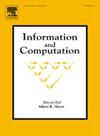实数上可计算的单向函数
IF 1
4区 计算机科学
Q3 COMPUTER SCIENCE, THEORY & METHODS
引用次数: 0
摘要
计算复杂性中一个主要的开放问题是单向函数的存在性,即一个从字符串到字符串的函数,它在计算上很容易计算,但很难反转。Levin(2023)从可计算性的角度阐述了从实数(无限位序列)到实数的单向函数的概念,并提出了部分可计算的单向函数是否存在。我们利用暂停问题的硬度和展示一个完全可计算的单向函数给出了一个强的正答案。本文章由计算机程序翻译,如有差异,请以英文原文为准。
Computable one-way functions on the reals
A major open problem in computational complexity is the existence of a one-way function, namely a function from strings to strings which is computationally easy to compute but hard to invert. Levin (2023) formulated the notion of one-way functions from reals (infinite bit-sequences) to reals in terms of computability, and asked whether partial computable one-way functions exist. We give a strong positive answer using the hardness of the halting problem and exhibiting a total computable one-way function.
求助全文
通过发布文献求助,成功后即可免费获取论文全文。
去求助
来源期刊

Information and Computation
工程技术-计算机:理论方法
CiteScore
2.30
自引率
0.00%
发文量
119
审稿时长
140 days
期刊介绍:
Information and Computation welcomes original papers in all areas of theoretical computer science and computational applications of information theory. Survey articles of exceptional quality will also be considered. Particularly welcome are papers contributing new results in active theoretical areas such as
-Biological computation and computational biology-
Computational complexity-
Computer theorem-proving-
Concurrency and distributed process theory-
Cryptographic theory-
Data base theory-
Decision problems in logic-
Design and analysis of algorithms-
Discrete optimization and mathematical programming-
Inductive inference and learning theory-
Logic & constraint programming-
Program verification & model checking-
Probabilistic & Quantum computation-
Semantics of programming languages-
Symbolic computation, lambda calculus, and rewriting systems-
Types and typechecking
 求助内容:
求助内容: 应助结果提醒方式:
应助结果提醒方式:


